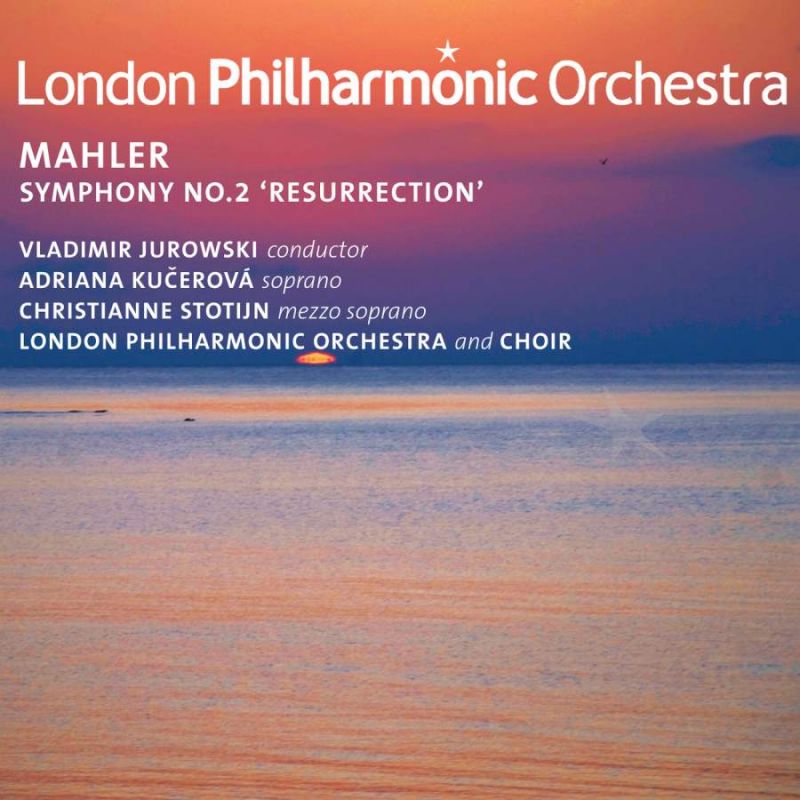Mahler Symphony No 2
Finally a Resurrection to prompt superlatives
View record and artist detailsRecord and Artist Details
Composer or Director: Gustav Mahler
Genre:
Orchestral
Label: LPO
Magazine Review Date: 8/2011
Media Format: CD or Download
Media Runtime: 83
Mastering:
Stereo
DDD
Catalogue Number: LPO0054

Tracks:
| Composition | Artist Credit |
|---|---|
| Symphony No. 2, 'Resurrection' |
Gustav Mahler, Composer
Adriana Kucerová, Soprano Christianne Stotijn, Mezzo soprano Gustav Mahler, Composer London Philharmonic Choir London Philharmonic Orchestra Wladimir Jurowski, Conductor |
Author: Edward Seckerson
The really big factor here is Jurowski’s command of Mahler’s very particular and very dramatic way with rubato and the shock of newness that comes from those explicit extremes. The urgency of the opening Allegro maestoso (the emphasis, unlike Rattle, on the allegro) is strikingly underlined with the premature arrival of the lyric second subject where Jurowski’s emphasis on the agitated bass-line has an edge-of-seat disquiet. When the music does settle – the balmy second subject now shyly reappearing – the effect is doubly magical. Weight in Jurowski’s reading does not necessarily mean sheer heft but rather the breadth of those big expansive ritenutos and tenutos. Rarely have I heard the wild neurotic contrasts in this music more scrupulously and uncompromisingly realised: emphatic marcatos, wild accelerandos so sudden and unexpected that you reach for the score for confirmation and then wonder why so many conductors downplay or simply ignore them.
So many moments in this first movement sound renewed: the grisly tread of string basses marking the approach to the climax of the development; the electrifying col legno passage, like the beating wings of the angel of death, so deliberate as to accentuate the sudden rush to the precipice (note: no ritardando) and the terrifying reiteration of that ugly stack of notes marking the point of no return. Then that beautiful passage in portamento-festooned strings demonstrating just how far the LPO have come under Jurowski’s directorship.
A strange distracted elegance marks the second movement, with the restless string ostinato and especially the entry of the string basses serving to remind us that this is no mere diversion but rather an ironic variant, the flip-side, if you like, of the first movement. The pizzicato return has a sinister charm, a deliberation, which suggests a different kind of march – the elfin variety. And that ironic rusticity proceeds in the vividly projected third movement with its quirky country dance in fiddle and flute, and delicious Trio in close-harmony trumpets. The climaxes again romp forwards with precipitous abandon while the soft, still, maternal voice of Christianne Stotijn seems to emerge supernaturally from the final tam-tam stroke.
The finale is tremendous and highly theatrical, with spatial effects beautifully managed in a hall not noted for its accommodation of acoustical special effects. The anticipation of the silence before the brass chorale deliver the Dies irae is heart-stopping, as is the hair-raising climax setting the offstage band on a collision course with the orchestra. You might quibble that the soprano soloist, Adriana Ku∂erová, is set too close for that magical separation from the chorus but the whole final paragraph is thrilling, with Mahler’s returning Resurrection hymn phrased with urgency and uplift. You may think you know how Mahler’s Second Symphony goes. Think again.
Explore the world’s largest classical music catalogue on Apple Music Classical.
Included with an Apple Music subscription. Download now.

Gramophone Digital Club
- Digital Edition
- Digital Archive
- Reviews Database
- Events & Offers
From £9.20 / month
Subscribe
Gramophone Club
- Print Edition
- Digital Edition
- Digital Archive
- Reviews Database
- Events & Offers
From £11.45 / month
Subscribe
If you are a library, university or other organisation that would be interested in an institutional subscription to Gramophone please click here for further information.






